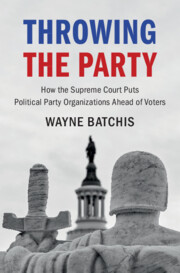Book contents
- Throwing the Party
- Cambridge Studies on Civil Rights and Civil Liberties
- Throwing the Party
- Copyright page
- Contents
- Preface
- Acknowledgments
- Part I Foundations
- 1 Introduction
- 2 The Supreme Court’s Approach to Political Parties
- 3 The Association versus the Individual
- Part II Party Primaries
- Part III The Party, the Court, and Campaign Finance Law
- Part IV Passé Equal Protection and a Way Forward
- Index
3 - The Association versus the Individual
from Part I - Foundations
Published online by Cambridge University Press: 16 June 2022
- Throwing the Party
- Cambridge Studies on Civil Rights and Civil Liberties
- Throwing the Party
- Copyright page
- Contents
- Preface
- Acknowledgments
- Part I Foundations
- 1 Introduction
- 2 The Supreme Court’s Approach to Political Parties
- 3 The Association versus the Individual
- Part II Party Primaries
- Part III The Party, the Court, and Campaign Finance Law
- Part IV Passé Equal Protection and a Way Forward
- Index
Summary
The Supreme Court’s freedom of association jurisprudence, broadly construed, is deeply problematic.1 The Founders framed the First Amendment in human terms. Justice Scalia, who was in the majority in the controversial Citizens United decision that afforded corporations (a kind of association) a free speech right to spend unlimited sums on political “speech,” has himself acknowledged “that when the Framers ‘constitutionalized the right to free speech in the First Amendment, it was the free speech of individual Americans that they had in mind.’”2 However, what began as an individual First Amendment right to join with a group for expressive purposes, which was derived from that individual’s explicit right to speak in the First Amendment, over time became a right possessed by the association itself. Scalia’s justification for expanding this right beyond the individual was the seemingly intuitive assumption that an “individual person’s right to speak includes the right to speak in association with other individual persons.”3 However, individual speech and associational speech are fundamentally different, and often irreconcilable.
- Type
- Chapter
- Information
- Throwing the PartyHow the Supreme Court Puts Political Party Organizations Ahead of Voters, pp. 32 - 60Publisher: Cambridge University PressPrint publication year: 2022



